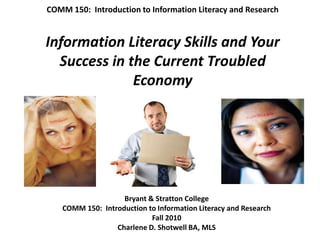
"Information Literacy Skills and Your Success in the Current Troubled Economy."
- 1. COMM 150: Introduction to Information Literacy and ResearchInformation Literacy Skills and Your Success in the Current Troubled Economy Bryant & Stratton College COMM 150: Introduction to Information Literacy and Research Fall 2010 Charlene D. Shotwell BA, MLS
- 3. If you are a recent high school graduate or new to college, you may be confused as to the career path you wish to take and what types of skills you will need to be successful in that career.Your success in the job training, job seeking and job interview processes will be heavily influenced by how skilled you are in locating, utilizing and critically evaluating information! DISCUSS: How much research did you do before deciding to enroll in Bryant & Stratton?
- 5. National, state and local level salary data– including differences between entry level and experienced level wages.
- 6. Current social and economic trends that are affecting the workforce at a national, state and local level.
- 7. How to thoroughly and effectively research potential employers or business partners.To be truly successful, you must not enter into a job search blindly. Proper career planning takes advanced research and analytical skills. Be an informed job seeker! DISCUSS: The last time you went on an interview, did you perform background research about the company? How did this help during the interview?
- 8. CURRENT STATE OF THE ECONOMY AT STATE AND LOCAL LEVELS:Early this year an article appearing in the Employment in New York State newsletter mentioned, “This economic slump is the longest recession the U.S. has faced since the Great Depression in the 1930s,” yet some economists argue that the recession is ending or has already ended because private sector job loss has declined (Jack, 2010, p. 1). We have all likely personally been hit by the recession in one way or another. Either ourselves or friends of family members have lost jobs or had to make work or lifestyle adjustments in response to the economy. DISCUSS: How have you been hit by the recession? How does it make you feel?
- 9. The Employment in New York State newsletter adds, “Despite slowing job losses in the U.S., this slump is already the worst in 75 years. The national private sector job loss during this recession passed 8.5 million at the end of 2009.” (Jack, 2010, p. 1). The newsletter also adds that:Even when the nation starts to recover, New York State may take years to gain back all of the jobs lost in the recession.Note: Educational and health services industries were the only industries to gain jobs during the recession.
- 10. CURRENT STATE OF THE NATIONAL ECONOMY: Because of the national recession, many workers are now “displaced” by layoffs, downsizing, etc. Displaced workers are now “re-employed” in other fields, often in areas other than the workers’ original industries of experience and also often in lower-level positions than what the workers previously held. The Pew Research Center (2010) reports that, “most ‘re-employed' workers say they're overqualified for their new job.” Yet others are considerably personally and financially satisfied in their new employment. Better information literacy skills will help you to be flexible and adaptable and always willing to learn new skills. Such traits are crucial to have in the current economy! DISCUSS: Have you or anyone you know had to become “re-employed” in another field? How did you or this person react? Did the job match previous qualifications or pay?
- 12. Retail and road construction projects were halted due to the economy and/or lack of funding.
- 13. New and existing home sales were down.
- 15. John Slenker (2010) adds, “Despite the large number of recent layoffs, job openings do exist -- even in a bad recession. Data from the Business Employment Dynamics program show that new and growing firms added more than 1.78 million jobs in New York State in 2008. This was about 93 percent of the yearly jobs added from 2003-2008, when the state’s economy was expanding. The key is to find thriving innovative and creative companies, and to match your skills with their needs. Above all: keep looking for work -- opportunities are out there,” (p. 2). Just as Slenker says, you must seek to find opportunities with “innovate and creative companies” and develop your skill set to match those companies’ needs. Becoming educated and finding employment may be a bit more challenging in the current national and local economy, yet by being an information literate and informed individual, your chances of success are much greater! DISCUSS: How do you feel about the current job outlook? Positive? Negative? What are you doing to prepare?
- 16. References Morin, R. (2010, September 2). Most ‘re-employed' workers say they're overqualified for their new job. Pew Research Center. Retrieved September 12, 2010, from http://pewresearch.org/pubs/1718/re-employed- workers-recession-satisfaction-job-qualification Slenker, J. (2010, February). Focus on Western New York. The 2009 recession: A case of creative destruction? [Electronic version]. Employment in New York State. Retrieved September 12, 2010, from http://www.labor.state.ny.us/stats/PDFs/enys0210.pdf University at Buffalo Regional Institute. (2010, February 24). Low-wage earners wre the focus of the latest policy brief by UB Regional Institute [Press release]. Retrieved September 12, 2010, from http://www.buffalo.edu/news/10992
